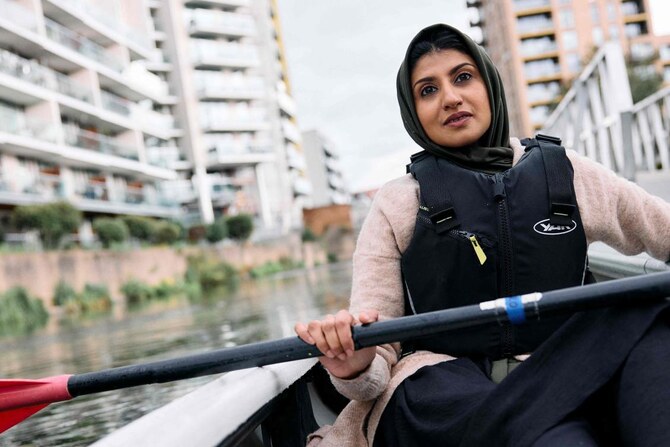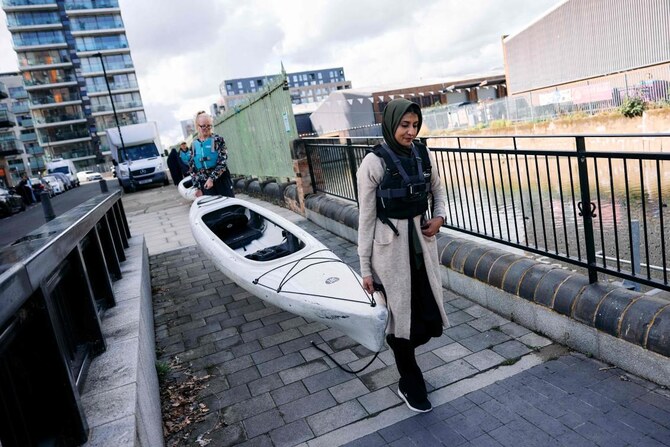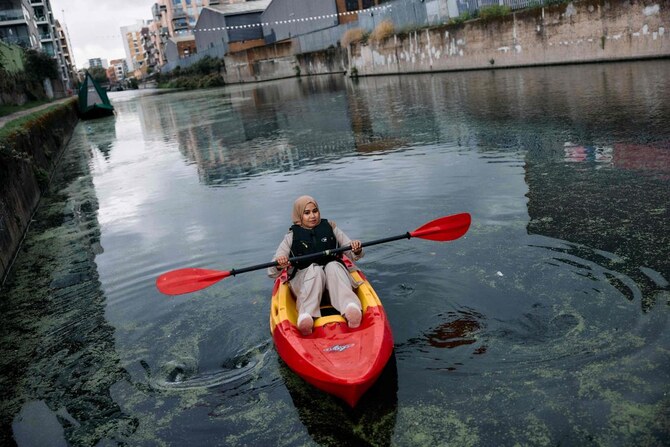London: Paddle dipped gently below mossy water, Dilruba Begum guided the kayak and a trainee sat in front of her down a canal in east London.
“Out here, you can be anyone,” she whispered as she lifted the paddle up to allow the kayak to drift with the current.
Two years ago, when Dilruba, 43, was swamped with mothering duties, a friend told her about a free, women-only program to learn paddle sports near her home.
Now she is a qualified paddle sport instructor, after taking part in the program run by local housing and community regeneration body Poplar HARCA.
Dilruba and her fellow paddlers are breaking new ground, encouraging women from London’s less advantaged eastern neighborhoods to embrace water sports that many felt were inaccessible to ethnic minorities like them with stretched resources and limited leisure time.
The initiative has grown in the last two years from a pilot project with 18 women to a group of around 70.
Among them are women who are “working, some are full-time mums, some haven’t been out of the house in years,” Dilruba told AFP.
Nine of them, including Dilruba and Atiyya Zaman, 38, have qualified as instructors and started London’s first boat club with an all-female, Muslim committee.
On a rain-soaked September afternoon, the pair led their first session, teaching a small group of women how to use kayaks and inflatable paddle boards.
Life vests secured, they demonstrated different maneuvers to participants on a small pontoon before lowering themselves into kayaks to begin the session on Limehouse Cut.
The canal runs through Poplar and Bow in Tower Hamlets, one of the city’s most deprived and densely populated boroughs.
One aim of the initiative is to improve local people’s access to “blue spaces” in Poplar, which lies at the heart of 6.5 kilometers (3.7 miles) of uninterrupted waterways.
“I live next to the canal, and I used to see people going (on it) all the time. I did always wonder how it would feel if I could do that?” said Atiyya, bobbing up and down on an orange kayak.
Jenefa Hamid, from Poplar HARCA, said many people from black, Asian and minority ethnic (BAME) backgrounds that make up most of the local community “thought water sport was not something that’s typically for them.”
This could be due to a fear of drowning, as well as cultural and religious reasons. “I think it is just feeling socially excluded,” she added.
According to Sport England data from 2017 to 2019, less than one percent of Asian (excluding Chinese) adults participated in water sports, and all BAME communities were under-represented in swimming activities.
Some of the women in the group “haven’t even been in the water before,” said Atiyya.
“When I started, especially women within this community, we would never do this sort of thing.”
Making the program women-only and allowing different attire made it welcoming to local Muslim women.
Naseema Begum, 47, who was part of the initial cohort and is now an instructor, said there was a “taboo” preventing Asian women and those wearing headscarves from taking part in water sports.
Wearing a niqab, Naseema wanted to show that “you can wear anything and go in the water. As long as you’ve got the right equipment... anyone can take part.”
Women were also attracted by the affordability. Private boating clubs are “quite unaffordable if you’ve got a family to maintain,” said Naseema, adding that she could not justify spending the amount on her own “leisure.”
Naseema now chairs the “Oar and Explore” boat club. With Atiyya and Dilruba, they hope to raise enough funds to acquire their own boats and a storage space by a new pontoon planned for the area.
“The way I felt, the enjoyment and the confidence that I’ve built from this, I want to pass it on to others and tell them there’s more to life,” said Dilruba.
Part of the enjoyment for her was a rare chance to “just sit down with your thoughts, not think about anything else.”
Atiyya agreed. “During Covid, it was quite hard with three young children at home, and then with work, it was very stressful. This was a way to escape,” she said.
Dilruba credits the instructors for helping her become one herself — and opening up a new world.
“They have lifted us up and made us into some new people, with new experiences... new skills we never thought we would have,” she said.
Muslim women break taboos navigating east London’s waterways
https://arab.news/whdnn
Muslim women break taboos navigating east London’s waterways

- The initiative has grown in the last two years from a pilot project with 18 women to a group of around 70
’Return to your country’ Kabul tells Afghans rebuffed by Washington

- US President Trump this week announced travel ban targeting 12 countries, including Afghanistan
- Afghan PM assures nationals of protection even if they worked with US-led forces against Taliban
KABUL: The Taliban government on Saturday urged Afghans hoping to emigrate to the United States to instead return to Afghanistan, after Washington tightened entry conditions.
US President Donald Trump this week announced a travel ban targeting 12 countries, including Afghanistan, which his proclamation said lacked “competent” central authorities for processing passports and vetting.
Commenting on the ban on Saturday, Prime Minister Hassan Akhund urged Afghans to return to their country, saying they would be protected even if they worked with US-led forces in the two-decade fight against the Taliban insurgency.
“For those who are worried that America has closed its doors to Afghans... I want to tell them, ‘Return to your country, even if you have served the Americans for 20 or 30 years for their ends, and ruined the Islamic system’,” he said in a speech marking the Eid Al-Adha holiday, broadcast by state media.
“You will not face abuse or trouble,” he said, making reassurances that the Taliban Supreme Leader Hibatullah Akhundzada had “granted amnesty for all.”
After surging to power in 2021, Taliban authorities announced a general amnesty for Afghans who worked with the Western-backed forces and government. However, the United Nations has recorded reports of extrajudicial killings, detentions and abuses.
In the past four years, the Taliban government has imposed a strict view of Islamic law and restrictions on women which the UN says amount to “gender apartheid.”
Afghans fled in droves to neighboring countries during decades of conflict, but the chaotic withdrawal of US-led troops saw a new wave clamoring to escape Taliban government curbs and fears of reprisal for working with Washington.
The United States has not had a working embassy in Afghanistan since 2021 and Afghans must apply for visas in third countries, principally Pakistan which has recently ramped up campaigns to expel Afghans.
Since Trump returned to the White House in January, Afghans have gradually seen their chances of migrating to the United States or staying there shrink.
Trump administration orders have disrupted refugee pathways and revoked legal protections temporarily shielding Afghans from deportation starting in July.
France’s president will visit Greenland in a show of EU unity, Danish leader says

- Frederiksen and the French leader said they will meet in the semiautonomous Danish territory on June 15
- Frederiksen acknowledged the “difficult foreign policy situation in recent months”
COPENHAGEN: French President Emmanuel Macron will travel to Greenland next weekend, the Danish prime minister’s office said Saturday — a visit by a high-profile European Union leader in the wake of US expressions of interest in taking over the mineral-rich Arctic island.
Prime Minister Mette Frederiksen and the French leader said they will meet in the semiautonomous Danish territory on June 15, hosted by Greenland’s new prime minister, Jens-Frederik Nielsen.
The visit by Macron, whose nuclear-armed country has one of the EU’s strongest militaries, comes as US President Donald Trump hasn’t ruled out using force to carry out his desire for the resource-rich and strategically located island to become part of the United States.
While the issue of US interest in Greenland has drifted from the headlines in recent weeks, Nielsen said in late April that such comments by US leaders have been disrespectful and that Greenland will never be “a piece of property” that anyone can buy.
In the statement Saturday, Frederiksen acknowledged the “difficult foreign policy situation in recent months” but praised “great international support” for Greenland and Denmark.
“President Macron’s upcoming visit to Greenland is yet another concrete testament to European unity,” she said, alluding to the membership of France and Denmark in the 27-member-country EU.
The three leaders were expected to discuss security in the North Atlantic and the Arctic, as well as issues of economic development, climate change and energy during the visit, her office said.
Wagner Group leaving Mali after heavy losses but Russia’s Africa Corps to remain

Mali, along with neighbors Burkina Faso and Niger, has for more than a decade battled an insurgency fought by armed groups
DAKAR: The Russia-backed Wagner Group said Friday it is leaving Mali after more than three and a half years of fighting Islamic extremists and insurgents in the country.
Despite Wagner’s announcement, Russia will continue to have a mercenary presence in the West African country. The Africa Corps, Russia’s state-controlled paramilitary force, said on its Telegram channel Friday that Wagner’s departure would not introduce any changes and the Russian contingent will remain in Mali.
“Mission accomplished. Private Military Company Wagner returns home,” the group announced via its channel on the messaging app Telegram. It said it had brought all regional capitals under control of the Malian army, pushed out armed militants and killed their commanders.
Mali, along with neighbors Burkina Faso and Niger, has for more than a decade battled an insurgency fought by armed groups, including some allied with Al-Qaeda and the Daesh group.
As Western influence in the region has waned, Russia has sought to step into the vacuum, sweeping in with offers of assistance. Moscow initially expanded its military cooperation with African nations by using the Wagner Group of mercenaries. But since the group’s leader, Yevgeny Prigozhin, was killed in a plane crash in 2023, after mounting a brief armed rebellion in Russia that challenged the rule of President Vladimir Putin, Moscow has been developing the Africa Corps as a rival force to Wagner.
Africa Corps is under direct command of the Russian defense ministry.
According to US officials, there are around 2,000 mercenaries in Mali. It is unclear how many are with Wagner and how many are part of the Africa Corps.
Beverly Ochieng, a security analyst specializing in the Sahel for Control Risks consultancy, said the Russian defense ministry had been negotiating with Mali to take on more Africa Corps fighters and for Wagner mercenaries to join Russia’s state-controlled paramilitary force.
“Since the death of Prigozhin, Russia has had this whole plan to then make the Wagner Group fall under the command of the Ministry of Defense. One of the steps they made was to revamp or introduce the Africa Corps, which is the way in which the Russian paramilitaries would retain a presence in areas where the Wagner group has been operating,” Ochieng said.
Wagner has been present in Mali since late 2021 following a military coup, replacing French troops and international peacekeepers to help fight the militants. But the Malian army and Russian mercenaries struggled to curb violence in the country and have both been accused of targeting civilians.
Last month, United Nations experts urged Malian authorities to investigate reports of alleged summary executions and forced disappearances by Wagner mercenaries and the army.
In December, Human Rights Watch accused Malian armed forces and the Wagner Group of deliberately killing at least 32 civilians over an 8-month span.
The announcement of Wagner’s withdrawal comes as the Malian army and the Russian mercenaries suffered heavy losses during attacks by the Al-Qaeda linked group JNIM in recent weeks.
Last week, JNIM fighters killed dozens of soldiers in an attack on a military base in central Mali.
Rida Lyammouri, a Sahel expert at the Morocco-based Policy Center for the New South, said the major losses might have caused the possible end of Wagner’s mission.
“The lack of an official and mutual announcement from both the Malian authorities and Wagner indicate possible internal dispute which led to this sudden decision. Simultaneously, this could point to a new framework for Russian presence in the country,” he said.
Replacing Wagner with Africa Corps troops would likely shift Russia’s focus in Mali from fighting alongside the Malian army to training, said Ulf Laessing, head of the Sahel program at the Konrad Adenauer Foundation.
“Africa Corps has a lighter footprint and focuses more on training, providing equipment and doing protection services. They fight less than the ‘Rambo-type’ Wagner mercenaries,” Laessing said.
‘Return to your country’ Kabul tells Afghans rebuffed by Washington

- Akhund urged Afghans to return to their country, saying they would be protected even if they worked with US-led forces
- “You will not face abuse or trouble”
KABUL: The Taliban government on Saturday urged Afghans hoping to emigrate to the United States to instead return to Afghanistan, after Washington tightened entry conditions.
US President Donald Trump this week announced a travel ban targeting 12 countries, including Afghanistan, which his proclamation said lacked “competent” central authorities for processing passports and vetting.
Commenting on the ban on Saturday, Prime Minister Hassan Akhund urged Afghans to return to their country, saying they would be protected even if they worked with US-led forces in the two-decade fight against the Taliban insurgency.
“For those who are worried that America has closed its doors to Afghans... I want to tell them, ‘Return to your country, even if you have served the Americans for 20 or 30 years for their ends, and ruined the Islamic system’,” he said in a speech marking the Eid Al-Adha holiday, broadcast by state media.
“You will not face abuse or trouble,” he said, making reassurances that the Taliban Supreme Leader Hibatullah Akhundzada had “granted amnesty for all.”
After surging to power in 2021, Taliban authorities announced a general amnesty for Afghans who worked with the Western-backed forces and government. However, the United Nations has recorded reports of extrajudicial killings, detentions and abuses.
In the past four years, the Taliban government has imposed a strict view of Islamic law and restrictions on women which the UN says amount to “gender apartheid.”
Afghans fled in droves to neighboring countries during decades of conflict, but the chaotic withdrawal of US-led troops saw a new wave clamouring to escape Taliban government curbs and fears of reprisal for working with Washington.
The United States has not had a working embassy in Afghanistan since 2021 and Afghans must apply for visas in third countries, principally Pakistan which has recently ramped up campaigns to expel Afghans.
Since Trump returned to the White House in January, Afghans have gradually seen their chances of migrating to the United States or staying there shrink.
Trump administration orders have disrupted refugee pathways and revoked legal protections temporarily shielding Afghans from deportation starting in July.
Ukrainian attack damaged 10 percent of Russia’s strategic bombers, Germany says

- “More than a dozen aircraft were damaged, TU-95 and TU-22 strategic bombers as well as A-50 surveillance planes,” Freuding said
- US estimates that Ukraine’s audacious drone attack hit as many as 20 Russian warplanes
BERLIN: A Ukrainian drone attack last weekend likely damaged around 10 percent of Russia’s strategic bomber fleet and hit some of the aircraft as they were being prepared for strikes on Ukraine, a senior German military official said.
“According to our assessment, more than a dozen aircraft were damaged, TU-95 and TU-22 strategic bombers as well as A-50 surveillance planes,” German Major General Christian Freuding said in a YouTube podcast reviewed by Reuters ahead of its publication later on Saturday.
The affected A-50s, which function similarly to NATO’s AWACS planes by providing aerial situational awareness, were likely non-operational when they were hit, said the general who coordinates Berlin’s military aid to Kyiv and is in close touch with the Ukrainian defense ministry.
“We believe that they can no longer be used for spare parts. This is a loss, as only a handful of these aircraft exist,” he said. “As for the long-range bomber fleet, 10 percent of it has been damaged in the attack according to our assessment.”
The United States estimates that Ukraine’s audacious drone attack hit as many as 20 Russian warplanes, destroying around 10 of them, two US officials told Reuters, and experts say Moscow will take years to replace the affected planes.
Despite the losses, Freuding does not see any immediate reduction of Russian strikes against Ukraine, noting that Moscow still retains 90 percent of its strategic bombers which can launch ballistic and cruise missiles in addition to dropping bombs.
“But there is, of course, an indirect effect as the remaining planes will need to fly more sorties, meaning they will be worn out faster, and, most importantly, there is a huge psychological impact.”
Freuding said Russia had felt safe in its vast territory, which also explained why there was little protection for the aircraft.
“After this successful operation, this no longer holds true. Russia will need to ramp up the security measures.”
According to Freuding, Ukraine attacked two air fields around 100 kilometers (62 miles) from Moscow, as well as the Olenya air field in the Murmansk region and the Belaya air field, with drones trained with the help of artificial intelligence.
A fifth attack on the Ukrainka air field near the Chinese border failed, he said.
The bombers that were hit were part of Russia’s so-called nuclear triad which enables nuclear weapons deployment by air, sea and ground, he added.


















